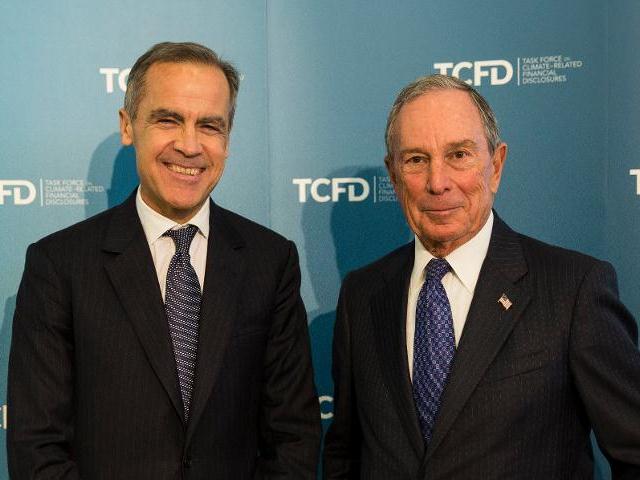G20在本月落幕,19國的領袖在G20宣言中重申堅守巴黎協定的立場。同時,G20金融穩定委員會下的工作小組公開承諾,將推動金融市場的氣候風險透明化,打頭陣的成員包括花旗、渣打、澳盛、瑞士商銀等11家大型銀行團,共代表超過7兆美元資金。
本月稍早於G20會議上簡報,G20金融穩定委員會主席、英國央行總裁卡尼(Mark Carney)要求工作小組幫企業、投資人、放款人和保險公司擬定一致的氣候風險自主揭露原則。

G20的「金融穩定委員會氣候相關金融透明工作小組」(Financial Stability Board's Task Force on Climate-Related Financial Disclosures,TCFD)花了18個月的時間,和企業界及金融領袖討論如何幫助企業對外溝通氣候相關資訊,最終版建議書由卡尼和前紐約市長兼TCFD主席彭博定稿。
建議書內容的主要特色包括:適用所有組織、包含在財務申報中、有助決策、前瞻財務影響、聚焦轉型低碳經濟的風險與機會。除工作小組和銀行團,聯合國環境金融倡議(United Nations Environment Finance Initiative,UNEP FI)也參與其中。
UNEP FI是聯合國環境規劃署和全球金融業在1992年地球高峰會後成立的合作關係,任務是推動永續金融。超過200家銀行、保險公司和投資人與之合作,以掌握今日的環境挑戰、與金融業的關係以及因應措施。
工作小組在建議書中指出,氣候變遷的後果並非幾年內可以解決的未來,而是正在發生中。「氣候變遷是組織今日面臨最嚴峻、也最受誤解的問題之一。雖然持續排放溫室氣體會造成地球暖化、損害經濟與社會運作已是共識,損害發生時間與嚴重程度卻是難以估計。大規模、長時間的自然問題帶來巨大挑戰,尤其是做經濟決策的時候。」工作小組寫道,「很多組織錯誤地認為氣候變遷的影響是長期的,沒必要急著今日解決。但其實氣候變遷對組織的影響並非只有實體的損害,也不是長期才會顯現。」
工作小組不諱言,轉型低碳經濟會創造機會和風險。「轉型低碳經濟預估需要每年1兆美元的投資,才能創造可預見的未來跟新投資機會。組織的風險回報概況中,氣候相關風險可能因氣候變遷對組織的實體損害、氣候政策和新科技而大幅改變。」
銀行團領袖們表示,瞭解氣候風險和機會讓金融機構更能資助轉型穩定與永續經濟。
瑞士商銀環境與社會風險管理首長Liselotte Arni對工作小組的建議書表示歡迎與支持,「這是幫助企業和投資人評估氣候變遷發展的一大步。我們期待與其他銀行合作實踐TFCD的建議內容。」
根據法新社報導,對建議書表示支持的銀行團包括美國銀行(Bank of America)、巴克萊集團(Barclays)、安盛集團(AXA Group)、安聯集團(Allianz SE)以及中國工商銀行。
其他支持企業則有聯合利華(Unilever)、陶氏化學(Dow Chemical Company)、塔塔鋼鐵(Tata Steel)和百事公司(PepsiCo)等產業巨擘,以及提供專業服務的「四大」會計師事務所、信評機構穆迪(Moody's)和標普全球(S&P Global),也都支持邁向氣候相關透明化行動。
目前只有唯一石油和天然氣企業荷蘭皇家殼牌集團(Royal Dutch Shell)支持這項行動。
Eleven of the world’s largest banks, representing over US$7 trillion, are making a public commitment to promote climate risk transparency in financial markets.
The banks’ commitments follow the publication late last month of the final recommendations by the G20’s Financial Stability Board's Task Force on Climate-Related Financial Disclosures, TCFD.
The Financial Stability Board, chaired by Bank of England Governor Mark Carney, asked the Task Force to develop voluntary, consistent climate-related financial risk disclosures for use by companies, investors, lenders and insurers.
The Task Force recommendations were presented in Hamburg, Germany at the G20 annual meeting earlier this month.
The final recommendations were authored by Carney and former New York mayor and TCFD chair Michael Bloomberg.
Key features of the recommendations are that they must be: adoptable by all organizations, included in financial filings, designed to solicit decision-useful, forward-looking information on financial impacts, and have a strong focus on risks and opportunities related to transition to a lower-carbon economy.
The industry Task Force spent 18 months consulting with business and financial leaders to develop its recommendations for helping companies to communicate their climate-related information.
The Task Force and banks are collaborating on this effort with the United Nations Environment Finance Initiative (UNEP FI) to promote climate transparency in financial markets.
UNEP FI, a partnership between UN Environment and the global financial sector created after the 1992 Earth Summit, promotes sustainable finance. Over 200 banks, insurers and investors work with UN Environment to understand today’s environmental challenges, why they matter to finance, and how to participate in addressing them.
In the report accompanying its final recommendations, the Task Force points out that the financial consequences of climate change are not just some far-off future situation that can be addressed in the years to come – they are happening right now.
“One of the most significant, and perhaps most misunderstood, risks that organizations face today relates to climate change,” the Task Force writes. “While it is widely recognized that continued emission of greenhouse gases will cause further warming of the planet and this warming could lead to damaging economic and social consequences, the exact timing and severity of physical effects are difficult to estimate. The large-scale and long-term nature of the problem makes it uniquely challenging, especially in the context of economic decision making.”
“Accordingly,” writes the Task Force, “many organizations incorrectly perceive the implications of climate change to be long term and, therefore, not necessarily relevant to decisions made today. The potential impacts of climate change on organizations, however, are not only physical and do not manifest only in the long term.”
The Task Force says it will be expensive to transition to a low-carbon world, generating opportunities but also risks.
“The expected transition to a lower-carbon economy is estimated to require around $1 trillion of investments a year for the foreseeable future, generating new investment opportunities.”
“At the same time,” the Task Force writes, “the risk-return profile of organizations exposed to climate related risks may change significantly as such organizations may be more affected by physical impacts of climate change, climate policy, and new technologies.”
Bank executives say that by improving their understanding of climate-related risks and opportunities, financial institutions are better placed to help finance the transition to a more stable and sustainable economy.
“We welcome and support the recommendations of the Task Force on Climate-related Financial Disclosures,” says Liselotte Arni, head of UBS environmental and social risk management. “They represent a major step forward to help businesses and investors assess the risks and exposures associated with climate change. We look forward to working with other banks on implementing the TFCD’s recommendations.”
※ 全文及圖片詳見:ENS










